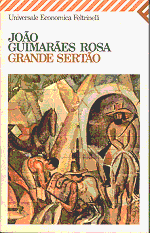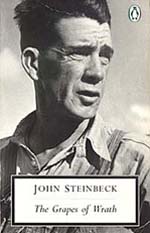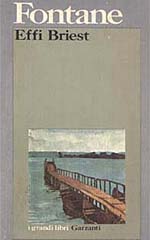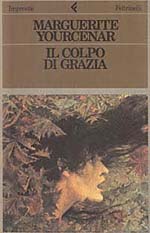|
I love books. A book is a precious thing by itself, even if sometimes its
content may be deceiving. Thus my favorite resources are the classics, those
big, old novels, full of true characters and living situations, stories that
set the fantasy free and then remain in memory, like silent companions, during
our entire adventure in this world.
|
|
- Grande Sertão - (The Devil to Pay in the Backlands)
novel (Rio de Janeiro, 1963)

|
The enchanting plateau of Northeast Brazil and its veredas (routes, pathways) are the playground of this epic and restless novel, which is written in an inimitable style and develops through six hundred pages of uninterrupted narration. The plot might remind of western stories, with a band of adventurers engaged in an endless fight to revenge a treacherous murder, but this story is plunged into an unique atmosphere, where the nature, and the landscape, as well as the devil himself, play their part as physical characters. It is a story of love and hate, lights and shadows, intense feelings and dread nightmares. Maybe some smart reader might anticipate the epilogue, which instead came completely unexpected to me, and I felt completely caught in the author's masterly narrative construction. |
- On the road -
novel (USA, 1957)
|
Jack Kerouac was born in 1922, so he was of the same generation of my father. For me it is hard to imagine two persons more different from each other than those two, as if they were separated by centuries. But my father grew up under fascism, went to war and was a prisoner in Germany. When he was back, he had a hard time to put together his pieces. In the meantime, JK, a strange figure of lonely mystic catholic, drove 40.000 km in 18 days, invented the beat generation and a brand new culture. This novel is so famous that it is a document before being a novel, but, and that is its merit, it is a great novel before being a document. I like it because... the only people for me are the mad ones, the ones who are mad to live, mad to talk, mad to be saved, desiderous of everything at the same time, the ones who never yawn or say a commonplace, but burn, burn, burn like fabulous roman candles... - |

|
- The Grapes of Wrath -
novel (USA, 1939)

|
Steinbeck's prose is pure and effective, his language essential and
straightforward. I am very fond of this writer and have always thought his
short stories, such as 'Junius Maltby' or 'The Red Pony', are the ideal reading
to learn and enjoy American English.
|
- Far from the madding crowd -
novel (Londra, 1874)
|
This novel has a happy ending, which is odd because the author is Thomas Hardy, the poet of the cursing of living. This was his first best selling novel, whose two main characters shows strong and positive personalities, each in his way. A fascinating plot, which absorbed me so much that I nearly fell in love with Gabriel Oak, the shepherd who knew all secrets of his sheep and was the only one who could save them from clover poisoning. The sheep's bellies were swollen and there was only one man in the neighbourhood who knew how to pierce them on a particular spot and relieve the air inside their guts. This is just one of the enthralling episodes of which the novel is rich, beside a love story in 'first quality' soap opera style. The playground is the misty and rich British countryside, in which only the names of places are fruit of fantasy. |

|
- Effi Briest -
novel (Berlino, 1895)

|
A real classic, this novel is the story of a woman narrated by a man, as in many other masterpieces, such as Flaubert's Madame Bovary, Tolstoj's Anna Karenina and Ibsen's Nora Helmer, to quote only a few. It is a disquieting book: when I finished reading it, I could not fall asleep, still I cannot say why. It is a story of unfaithfulness, an act neither conscious nor premeditated, a sin of loneliness, but a sin which the gray fogs of wild North Germany could not forgive. The plot is constructed around a single incident, with a scanty number of characters, but the writing is so skillful and enviable, as enviable are the melodies of great musicians, that in no effort delineates the picture of one of the worst danger in our social life: the punishment for a mistake for which one hardly feels responsible. |
- Le coup de grace - (The blow of grace)
novel (1939)
|
Choosing one of Marguerite Yourcenar's works is very difficult, because most of her books are inimitable masterpieces. But when I read "The blow of Grace" in my teenager years, hardly knowing anything at all about the writer, it was love at first sight. In Yourcenar's words, this short novel represents “an almost pure conflict of passions and of will”. What captivated me most the first time, and still delight me as I open this book, is the strength and the intensity of the words, which sculpture images and feelings, and create scenes and atmospheres as real as we were looking at and living in them, without any fault, without any smear. The plot is a very romantic one, as if a piece of XIX century was creeping inside a still young XX century. Most critics describe the moral bewilderment, which pervades the main characters of the story, as significantly close to our present moral confusion and Yourcenar's writing as ahead of times. That may be true, but, as it is hard to imagine a world free from moral confusion, probably what MY narrates here is just the tale of a human and timeless strife. |

|
| Home | Italian version |
If you want to send me a message
please copy the address below
© 2000-2005
Carla Marchetti